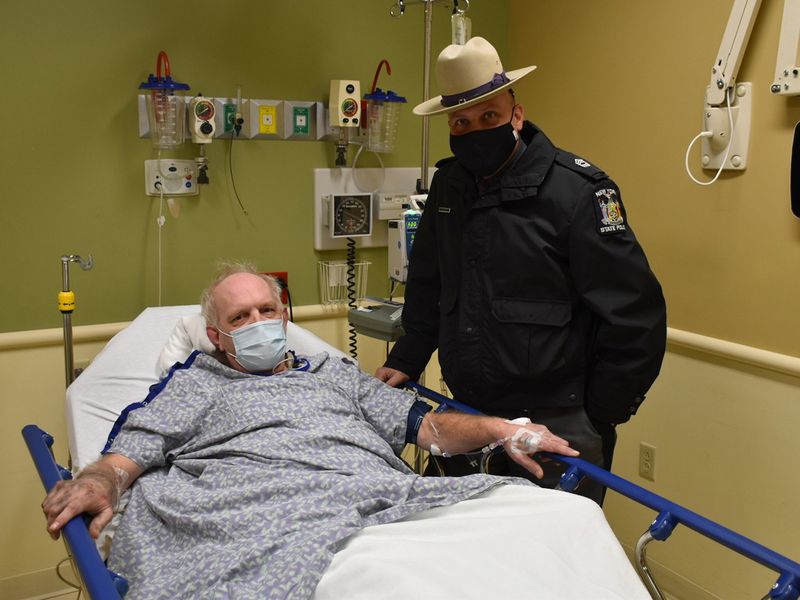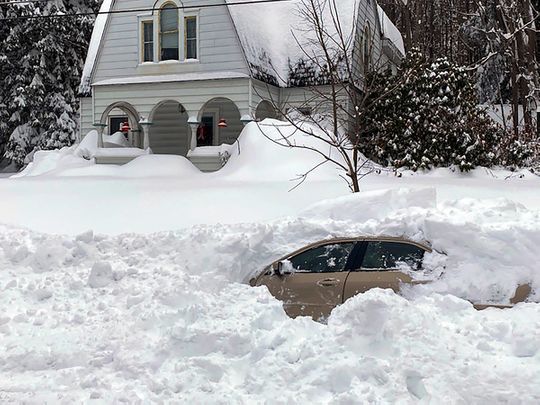New York: It was around midnight Thursday, and the snow in upstate Owego, New York, was falling at what officials estimated was a rate of 4 inches an hour. By the time it stopped, there would be 40 inches on the ground.
With the storm swirling around him, Kevin Kresen was in his car about 15 miles from home when, he said, a belt in his engine came loose, knocking out the power steering and forcing him off the road into a ditch.
After trying unsuccessfully to fix the problem, he got back into the car and called 911. It was the first several of such calls he would make over the next 10 hours as the fierce snowfall trapped him in the unheated car and a passing plow sealed him in even further, officials said.
Kresen was finally rescued by Jason Cawley, a State Police zone sergeant, who started his own day by getting stuck in the snow left by a nor’easter so severe it prompted Gov. Andrew Cuomo to declare a state of emergency across a wide swath of New York.
Cawley said he believed that if he had not found Kresen when he did, it might have been another five hours before the next plow came through and cleared some of the snow off the car, making it visible. By then, he said, Kresen would probably have been dead.

Image Credit: NYT
“I don’t think he would have made it another hour and a half,” the sergeant said.
In addition to Kresen’s car being entombed in snow, law enforcement officers responding to his calls for help had been stymied in their efforts to find him because he was in an area with spotty cellphone service. The car’s location could only be narrowed to a 3-mile stretch of state highway, officials said.
Cawley said that when he started his shift around 8 a.m., he had checked with the Tioga County emergency call center to see where his help was needed. He was told that Kresen had not yet been found.
The sergeant began his search by driving back and forth along the 3 miles where the missing car was believed to be. He estimated that he had done that 10 times before stopping.
“I realized at some point that his car was invisible,” Cawley, a 22-year State Police veteran, said. “It was here. I just couldn’t see it.”
He said he decided on a new tack: He drove to one end of the stretch he had been searching, got out of his vehicle and climbed up one side of the snowbank and down the other, looking for a sign of the missing car. He repeated the exercise every 100 yards, he said.
After a time, he said, he learned from the 911 center that a call had just come in from Kresen’s phone but had almost immediately been cut short. The call center was, however, able to provide an address where the call appeared to have come from, and Cawley said he used the computer in his car to confirm it.
Arriving at the spot and getting out of his car, he said, he noticed a section of snowbank that was about 6 inches taller than the rest. Thinking it was a row of mailboxes, he began to dig away at the snow in hopes of determining that he had the right address. That, he said, was when he hit the car window.
“My heart nearly jumped,” he said.
As for Kresen’s reaction, the sergeant said, “He was excited as he could be.”
Kresen told Cawley through the window that he could not feel his feet. A passerby helped dig away enough snow to get Kresen out of the car. Cawley took him to a local ambulance corps; from there Kresen was taken to Ascension Lourdes Hospital in Binghamton, where he was treated for frostbite and hypothermia and released.
The spot where Kresen was trapped was not far from a house where he could have presumably sought help, but Cawley said he might not have realized that because the house was white and did not stand out in the heavy snow.
And in any case, the sergeant said, “He said he felt safer in the car.”
Safe as he may have been, Kresen was clearly in distress when he was rescued.
“When we pulled him out of the car, he wasn’t shivering, and I took that as a good sign,” Cawley said. But he soon realized it was actually a bad sign and an indication of how far Kresen’s body temperature had fallen.
Reached on Friday, Kresen, 58, who lives in Candor, New York, said he was “feeling pretty good” after his ordeal.
He said he had been “nervous” but not scared as the hours passed with no help in sight. He played CDs until the car’s battery died and used the two phones he had only to call 911 so he could save power. Otherwise, he said, he just tried to stay awake.
“I’m not afraid of death,” he said. “If it’s my time to go, it’s my time to go, whether it’s hypothermia or whatever.”
Still, he said he was “ecstatic” at the arrival of Cawley, whose efforts he called “heroic.”
“Oh my God, I was happy,” he said.



